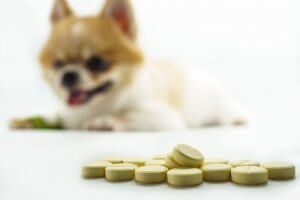Dog Joints: Natural vs Chemical Supplements


Written and verified by the biologist Ana Díaz Maqueda
Nowadays you can find a wide range of supplements for dog joints on the market. These products are made up of several molecules of chemical or natural origin, such as collagen, glucosamine sulfate, chondroitin sulfate, and hyaluronic acid, among others.
These nutritional supplements have been evolving and improving in the last few years, so veterinarians usually prescribe them to fight various conditions. Therefore, in this article, we’ll talk about the best supplements for dog joints.
The most common problems with dog joints

One of the many reasons why a dog visits the veterinarian is the appearance of joint ailments. A dog’s owner usually notices this problem in their dog due to the appearance of lameness and, sometimes, acute pain.
Joint problems in a dog can appear for many reasons, such as:
- The breed. Certain dog breeds, such as the German Shepherd, usually develop hip dysplasia. On the other hand, breeds such as the Golden Retriever, Rottweiler or Doberman, due to their large size and rapid growth, tend to suffer from shoulder or elbow dysplasia.
- Advanced age. Like other mammals, including humans, when dogs get into their old age, conditions linked to this vital stage appear. We’re talking here about canine degenerative joint disease.
- Growth problems. The period of a dog’s growth is a vital moment, as in other species. Therefore, food deficiencies, hormonal problems, or breed can cause joint damage.
- Fractures that involve a joint.
- Anterior cruciate ligament injury. Due to overexertion, excessive exercise, or a small breed type, the anterior cruciate ligament may rupture. This will result in serious joint problems.
- Obesity. In addition to greatly reducing your pet’s quality of life, obesity causes, among other things, joint overload. This can cause serious problems.
- Arthrosis.
- Arthritis.
Thus, in these circumstances, supplements for dog joints can be of great help in relieving joint ailments that these animals may have.
What are chondroprotectors?

Chondroprotectors are substances that help improve certain conditions that have to do with the joints. These problems are usually accompanied by inflammation of the joints and pain.
These supplements for dog joints effectively feed the articular cartilage and improve the consistency of the synovial fluid. Thus they consist mainly of hydrolyzed collagen and glucosamine sulfate, while others are made up of chondroitin sulfate or chondroitin sulfate.
List of the best supplements for dog joints
So, the research and development of new dog joint supplements in recent years has led to a marked improvement in these products. Currently, they have great value in remedies for the prevention of the osteoarticular degeneration processes and in the prevention of joint injuries in case of hereditary predisposition, joint overload, accidents, etc.
These products can be classified according to their base compounds since they all have the same purpose:
- Supplements made up of hyaluronic acid, hydrolyzed collagen, crystallized glucosamine, chondroitin sulfate, and gamma oryzanol. Therefore, supplements with this composition seem to work best because they act on all levels of the joints, hyaline cartilage, ligaments, tendons, and synovial fluid.
- Supplements that combine glucosamine and chondroitin sulfate. They are the most basic in the world of chondroprotectors, but there is scientific evidence of their properties.
- Supplements made up of chondroitin sulfate and vitamin E. Suitable for post-surgical processes that involve the immobilization of the joint.
- Supplements made up of chelated minerals (Cu, Mn, Se, Zn), organic calcium and egg membrane substances. These are nutritional supplements that favor bone regeneration.
Natural alternatives to chemical supplements

A popular alternative to chemical supplements exists that tends not to have a genetic predisposition to these conditions and is, above all, healthy. This alternative is widely used in dogs that eat a natural food-based diet, such as the BARF diet.
The recipe is known as turmeric golden paste. Its ingredients are:
- 5 tbsp of turmeric
- 1 c. of water
- 5 tbsp of coconut oil
- 2 tsp of freshly ground pepper
Nowadays you can find a wide range of supplements for dog joints on the market. These products are made up of several molecules of chemical or natural origin, such as collagen, glucosamine sulfate, chondroitin sulfate, and hyaluronic acid, among others.
These nutritional supplements have been evolving and improving in the last few years, so veterinarians usually prescribe them to fight various conditions. Therefore, in this article, we’ll talk about the best supplements for dog joints.
The most common problems with dog joints

One of the many reasons why a dog visits the veterinarian is the appearance of joint ailments. A dog’s owner usually notices this problem in their dog due to the appearance of lameness and, sometimes, acute pain.
Joint problems in a dog can appear for many reasons, such as:
- The breed. Certain dog breeds, such as the German Shepherd, usually develop hip dysplasia. On the other hand, breeds such as the Golden Retriever, Rottweiler or Doberman, due to their large size and rapid growth, tend to suffer from shoulder or elbow dysplasia.
- Advanced age. Like other mammals, including humans, when dogs get into their old age, conditions linked to this vital stage appear. We’re talking here about canine degenerative joint disease.
- Growth problems. The period of a dog’s growth is a vital moment, as in other species. Therefore, food deficiencies, hormonal problems, or breed can cause joint damage.
- Fractures that involve a joint.
- Anterior cruciate ligament injury. Due to overexertion, excessive exercise, or a small breed type, the anterior cruciate ligament may rupture. This will result in serious joint problems.
- Obesity. In addition to greatly reducing your pet’s quality of life, obesity causes, among other things, joint overload. This can cause serious problems.
- Arthrosis.
- Arthritis.
Thus, in these circumstances, supplements for dog joints can be of great help in relieving joint ailments that these animals may have.
What are chondroprotectors?

Chondroprotectors are substances that help improve certain conditions that have to do with the joints. These problems are usually accompanied by inflammation of the joints and pain.
These supplements for dog joints effectively feed the articular cartilage and improve the consistency of the synovial fluid. Thus they consist mainly of hydrolyzed collagen and glucosamine sulfate, while others are made up of chondroitin sulfate or chondroitin sulfate.
List of the best supplements for dog joints
So, the research and development of new dog joint supplements in recent years has led to a marked improvement in these products. Currently, they have great value in remedies for the prevention of the osteoarticular degeneration processes and in the prevention of joint injuries in case of hereditary predisposition, joint overload, accidents, etc.
These products can be classified according to their base compounds since they all have the same purpose:
- Supplements made up of hyaluronic acid, hydrolyzed collagen, crystallized glucosamine, chondroitin sulfate, and gamma oryzanol. Therefore, supplements with this composition seem to work best because they act on all levels of the joints, hyaline cartilage, ligaments, tendons, and synovial fluid.
- Supplements that combine glucosamine and chondroitin sulfate. They are the most basic in the world of chondroprotectors, but there is scientific evidence of their properties.
- Supplements made up of chondroitin sulfate and vitamin E. Suitable for post-surgical processes that involve the immobilization of the joint.
- Supplements made up of chelated minerals (Cu, Mn, Se, Zn), organic calcium and egg membrane substances. These are nutritional supplements that favor bone regeneration.
Natural alternatives to chemical supplements

A popular alternative to chemical supplements exists that tends not to have a genetic predisposition to these conditions and is, above all, healthy. This alternative is widely used in dogs that eat a natural food-based diet, such as the BARF diet.
The recipe is known as turmeric golden paste. Its ingredients are:
- 5 tbsp of turmeric
- 1 c. of water
- 5 tbsp of coconut oil
- 2 tsp of freshly ground pepper
All cited sources were thoroughly reviewed by our team to ensure their quality, reliability, currency, and validity. The bibliography of this article was considered reliable and of academic or scientific accuracy.
- Angela. (2018). Receta pasta de cúrcuma o golden paste. Diariowesty. Disponible en: http://diariowesty.es/receta-pasta-de-curcuma-o-golden-paste/
- Angulo, S. M. (2017). Estudio de la eficacia de un condroprotector (Hyaloral (R)) a prevención de la displasia de codo en perros de raza labrador y cruce de labrador y golden (Doctoral dissertation, Universidad Complutense de Madrid).
- Brusa, M. C., & Boccia, F. O. (2000). Enfermedad articular degenerativa canina: consideraciones sobre el manejo médico terapéutico. Analecta Veterinaria, 20.
- Kwinten, E. R. (2009). Aspectos anatómicos y biomecánicos de la articulación del codo del perro (canis familiaris) (Doctoral dissertation, Universidad de Zaragoza).
- Ráfales, C. B. (2012). Estudio clínico de los cambios osteoartrósicos de la rodilla inestable del perro por rotura del ligamento cruzado anterior (LCA) tras el tratamiento por osteotomía niveladora del platillo tibial (TPLO) con y sin condroprotectores (Doctoral dissertation, Universidad de Extremadura).
- Rivière, S. Fisioterapia en gatos y perros aplicada a los trastornos locomotores de origen artrítico. Conocimiento y Respeto… De los perros de utilidad a los perros de deporte p. 02, 32.
- Sellés, M., Rubio, A., Martínez, J. J., & Velasco, A. (2010). Respuesta funcional de las articulaciones osteoartrósicas en perros geriátricos tras el tratamiento con condroitín sulfato (Condrovet®) VERSUS PLACEBO (ESTUDIO FUNCIONAR). Clínica veterinaria de pequeños animales: revista oficial de AVEPA, Asociación Veterinaria Española de Especialistas en Pequeños Animales, 30(1), 0081-81.
- Velasco, A., Sellés, M., Chico, A., & Bonet, S. (2009). Evaluación de la eficacio postquirúrgica del Condroitín Sulfato (Condrovet). Clínica veterinaria de pequeños animales: revista oficial de AVEPA, Asociación Veterinaria Española de Especialistas en Pequeños Animales, 29(2), 0103-108.
This text is provided for informational purposes only and does not replace consultation with a professional. If in doubt, consult your specialist.








